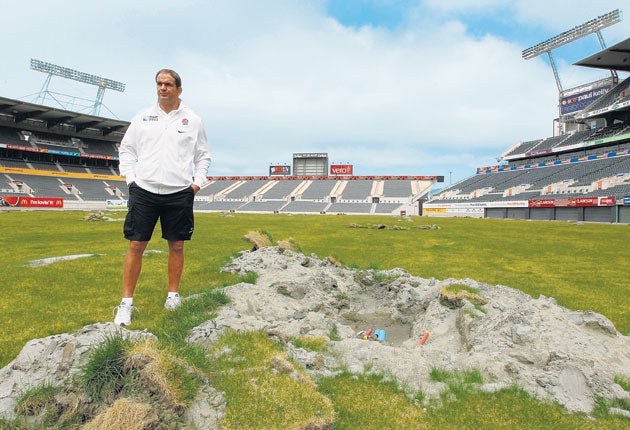Cricket World Cup 2015: Christchurch recovers from its nightmare day
England face Scotland on site of 2011 earthquake

Your support helps us to tell the story
From reproductive rights to climate change to Big Tech, The Independent is on the ground when the story is developing. Whether it's investigating the financials of Elon Musk's pro-Trump PAC or producing our latest documentary, 'The A Word', which shines a light on the American women fighting for reproductive rights, we know how important it is to parse out the facts from the messaging.
At such a critical moment in US history, we need reporters on the ground. Your donation allows us to keep sending journalists to speak to both sides of the story.
The Independent is trusted by Americans across the entire political spectrum. And unlike many other quality news outlets, we choose not to lock Americans out of our reporting and analysis with paywalls. We believe quality journalism should be available to everyone, paid for by those who can afford it.
Your support makes all the difference.At nine minutes to one on 22 February 2011, just as Christchurch was embarking on lunch-hour, 10 seconds irrevocably transformed the city. An earthquake, registering 6.3 on the Richter scale, struck. It claimed 185 lives, and unleashed unimaginable chaos. A state of national emergency was declared for over two months.
Four years and one day later, England and Scotland will face off in the World Cup in Christchurch tonight: the third and final match that Hagley Oval will host in the tournament.
“We welcome the chance to showcase Christchurch to the world as a city that is turning disaster into opportunity,” says Lianne Dalziel, the mayor of Christchurch. “When a city that has a reputation for being an excellent host city loses its heart through a disaster – as our earthquakes have done – it doesn’t mean we lose our spirit.”
Since the twin earthquakes in Christchurch in 2010-11 – one in September 2010 was even more ferocious but, because it occurred at 4.35am, no one was killed – over 1,200 buildings in the city have been demolished. Efforts have been made to rehabilitate the centre but it lacks the ordinary bustle of city life.
The main square feels particularly elegiac. The cathedral, nestled in the centre of the city, was devastated. The earthquake damaged its tower beyond repair; it was demolished altogether in 2012. The rest of the cathedral could yet suffer the same fate; the church supports replacing it with a completely new structure.
Other icons of Christchurch were even more badly affected. Just 24 days after it had last hosted a one-day international, the city’s rugby and cricket stadium, Lancaster Park, was rendered unusable by the damage to the stands and ground; it is now among the long queue of buildings scheduled to be demolished.
Christchurch inevitably lost all seven matches in the rugby World Cup that it had been awarded. When it came to the cricket World Cup, the city was determined to ensure it did not miss out again. It had been 23 years since New Zealand last hosted matches in the cricket World Cup. And it could be even longer until New Zealand hosts World Cup matches again. In their power grab of the International Cricket Council last year, Australia, England and India made apparent their intention to host all major events exclusively in the self-appointed “big three” countries.
So desperate was Canterbury Cricket to be part of the World Cup that it bid for matches even though it had no ground fit for purpose. Four years ago, the Hagley Oval was a picturesque club ground in the middle of Hagley Park. The only infrastructure the ground had was two slight clubhouses. A ground further away from the ICC’s onerous requirements to host World Cup matches it was hard to imagine.
“When we bid for World Cup games we had no ground – only a vision and a plan,” explains Lee Germon, chief executive of Canterbury Cricket. “We had to convince the ICC that not only would we have a ground capable of hosting these matches but the city and infrastructure for them.”
The ICC eschewed sentimentality: it simple could not afford for World Cup matches to be played at substandard venues. Canterbury City Council recognised the opportunity the World Cup represented. It put up NZ$9m (£4.4m) of funding within three months and helped to construct the Hagley Oval ground within 12 months, finishing in early 2014.
Even then hosting games was contingent on proving that the 8,000 permanent capacity of the ground could be extended to 20,000 for the World Cup. It was only four months ago that Hagley Oval was confirmed as a venue for the World Cup.
Even to those who care little for cricket, Christchurch’s role in the World Cup means a great deal. Locals talk of the event bringing hope and proof that normalcy is slowly returning.
“I don’t really follow cricket but it’s great to show how far the city has come,” one resident said. “Plus it’s great for tourism.”
Mayor Dalziel added: “We are very proud of our city in transition. This year we say: ‘Christchurch: It’s Happening.’ And the Cricket World Cup is where it starts.”
Join our commenting forum
Join thought-provoking conversations, follow other Independent readers and see their replies
Comments